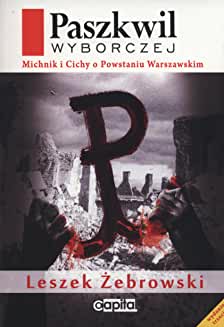Jew Killing WWII By Poles Warsaw ’44 Myth Zebrowski

Paszkwil Wyborczej, by Leszek Zebrowski. 2013
Michal Cichy Unmasked: False Accusations of Poles Killing Jews During the Soviet-Betrayed 1944 Warsaw Uprising
THE SLANDER BY GAZETA WYBORCZA is the title of this Polish-language work. This work is a sequel to the author’s 1995 work of the same title, Paszkwil Wyborczej. This 2013 edition presents some new information, and I focus on this information. It centers on Michal Cichy’s much-emphasized accusation that Polish guerrillas killed many fugitive Jews during the Warsaw Uprising.
The number of Jews killed could be 30 or 60. (p. 112). Some Jewish spokesmen have embellished it to 1,000. (p. 112). [If it serves anti-Polish propaganda purposes, why not? It is no different from all the many greatly-exaggerated Polish pogroms of the past.]
Author Leszek Zebrowski deconstructs Cichy’s claim, showing Cichy’s many elementary errors of fact, and an overall complete lack of analysis of the sources that Cichy cites. (p. 103). Historian Tomasz Strzembosz concludes that Cichy has, at most, proved the killings of 14 or 15 people, and that from banditry. From this, Cichy has spun the libelous story of the Armija Krajowa as an anti-Semitic organization. (pp. 84-85). I elaborate on specifics below.
WHO HAS AN INTEREST IN ATTACKING POLES?
In the Introduction, Tadeusz M. Pluzanski points out that Cichy’s mendacity flourishes in the atmosphere of contemporary (post)Communist Poland, where history is falsified. (p. 8). Historian Marek Jan Chodakiewicz traces the overall problem to the so-called Round Table agreements and who it is that rules Poland today. The attacks on Polish patriotism, those who ruled Communist-subjugated Poland, remain the same–only now they wear the uniform of post-modernism, liberalism, and progress. (p. 10).
Juliusz Bogdan Deczkowski, quoted author Leszek Zebrowski, has pointed out that Stalinist-era Communist propaganda sought to degrade the achievements of the Armia Krajowa (A. K.) and the NSZ (Narodowe Sily Zbrojne). This propaganda also painted these freedom fighters as Nazi collaborators, and the recent article Michal Cichy fits the same mold. (p. 82).
Adam Michnik vel Szechter, the editor of the left-wing GAZETA WYBORCZA that had originally published Michal Cichy’s “revelation” as gospel truth, has a distinctive history. He, his parents, and his relatives, had all been ardent Jewish Communists. Adam goes around spinning tales in defense of the reputation of his father Ozjasz Szechter. (pp. 54-55). Adam’s brother, Stefan Michnik, had been a Communist judge in the 1950’s, and had sentenced Polish patriot Major Andrzej Czaykowski, a winner of the Virtuti Militari award, to death. (pp. 56-57). Adam, while framing the following within the standard narrative of Polish anti-Semitism, tacitly admits that his break with Communism had occurred because the Jewish Communists had lost out to the gentile Communists in the events of 1968. (p. 42).
Those who had uncritically endorsed Michal Cichy’s attack on Poland are–not surprisingly–the same people who usually peddle such material. These include Teresa Prekerowa, Konstanty Gebert vel David Warszawski, Jan Jagielski, long-time Communist official Shmuel Krakowski, and Andrzej Kunert. (p. 83). Others include Barbara Engelking and Dariusz Libionka. (p. 195).
UNCLEAR MOTIVES AND UNKNOWN KILLERS
One of the sources that Cichy cited was Jadwiga Bokitko. However, examination of her testimony indicates that she saw 9 bodies that she SUSPECTED were that of Jews, and that the killers were either bandits or German agents wearing A. K. uniforms. (pp. 71-72). Obviously, the Jewishness of the victims, and still less anti-Semitic motives behind the killings, are unproven.
BANDITRY, NOT JEW-HATRED
Captain “Hal” (Waclaw Stykowski) had been accused of killing a large group of Jews at a building near 30 Twardej. Archival information shows that the murders were actually conducted by Corporal Unrug, who had been robbing people. The A. K. found much gold in the possession of Unrug, and executed this bandit. (pp. 73-74).
Cichy relies largely on the 1987 work of Born-Bornstein. However, Born-Bornstein points out that some of the A. K.’s weaponry fell into the hands of bandits, and that these bandits, who had killed Jews, had pretended to be A. K. (pp. 117-118).
UNDERSTANDING ZYGMUNT BAUMANN
The author discusses Zygmunt Baumann, who, until his recent death, was invited to speak at Polish universities, and who was “harassed” (poor thing!) by Poles who want him brought to justice. During WWII, Zygmunt Baumann had been Inspector of the Communist security forces in Moscow. Before 1953, Baumann (“Semjon”) was a high-level officer in the Bezpieka (U. B.) of the Soviet-imposed Communist puppet government of Poland. (p. 140).
To see a series of truncated reviews in a Category click on that Category:
- All reviews
- Anti-Christian Tendencies
- Anti-Polish Trends
- Censorship on Poles and Jews
- Communization of Poland
- Cultural Marxism
- German Guilt Dilution
- Holocaust Industry
- Interwar Polish-Jewish Relations
- Jewish Collaboration
- Jewish Economic Dominance
- Jews Antagonize Poland
- Jews Not Faultless
- Jews' Holocaust Dominates
- Jews' Holocaust Non-Special
- Nazi Crimes and Communist Crimes Were Equal
- Opinion-Forming Anti-Polonism
- Pogrom Mongering
- Poland in World War II
- Polish Jew-Rescue Ingratitude
- Polish Nationalism
- Polish Non-Complicity
- Polish-Ukrainian Relations
- Polokaust
- Premodern Poland
- Recent Polish-Jewish Relations
- The Decadent West
- The Jew as Other
- Understanding Nazi Germany
- Why Jews a "Problem"
- Zydokomuna